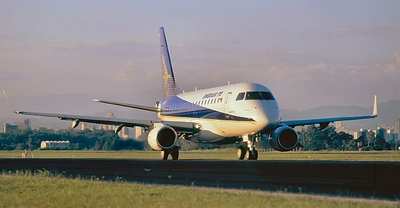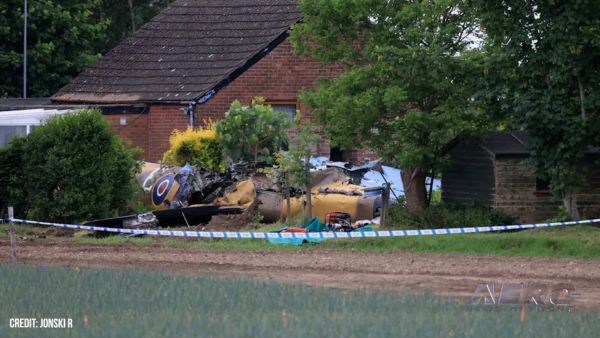Tue, Sep 06, 2011
Program Benchmarks Performance Of E-Jets And CF34-8E Engines
Powered With Sustainable HEFA Biofuel
Embraer and GE recently conducted a series of test flights with
an Embraer 170 jet flying from the Company's Gaviao Peixoto
facilities. The purpose of the tests was to benchmark the
operational characteristics of the airplane and its GE CF34-8E
engines when powered by HEFA (Hydro-processed Esters and Fatty
Acids) fuel under a broad range of unique flight conditions. The
flights involved powering one of the two GE engines with the
maximum ASTM permissible mix of 50% HEFA (derived from camelina)
with Jet-A.
Embraer 170 File Photo

Following the recent approval of biomass-based HEFA fuels by
ASTM, Embraer and GE have stepped up their efforts with the
objective of supporting the development of a broader range of
sustainable biofuels for aviation. With these tests, both companies
confirmed that technical plans and procedures for future fuels
testing are robust, enabling value-added and timely testing of
additional fuels.
"We have a strong and longstanding commitment to developing
efficient and environmentally responsible products. This series of
tests, and their very positive results, gives us a lot of new
information to continue our sustainability program as it relates to
future products," said Mauro Kern, Embraer Executive Vice President
of Engineering and Technology. "Supporting the development and
deployment of sustainable aviation biofuels is one of the
industry's top priorities, and we are firmly engaged in that
effort."
The series of flights, which happened in August 2011, set the
stage for further biofuel development programs that Embraer and GE
will undertake with fuel produced from additional feedstocks and
production pathways under consideration by the industry. These
fuels are currently under study by fuel providers worldwide,
including many in Brazil.

"Embraer and GE plan to engage in
future biofuel testing and ASTM substantiation activities. This
could encompass a broad range of pursuits, from testing of
additional fuel production pathways and feedstocks, to potentially
increasing HEFA blend levels," said Laurent Rouaud, Chief Marketing
Office, GE Aviation. "These flights have also demonstrated that the
aircraft and engine manufacturers are also interested in limiting
net carbon emissions from their ongoing product development
activities, and in working with producers to establish early
production demand for the benefit of the entire aviation
enterprise."
More News
Aero Linx: International Association of Professional Gyroplane Training (IAPGT) We are an Association of people who fly, build or regulate Gyroplanes, who have a dream of a single >[...]
NORDO (No Radio) Aircraft that cannot or do not communicate by radio when radio communication is required are referred to as “NORDO.”>[...]
Beyond Visual Line Of Sight (BVLOS) The operation of a UAS beyond the visual capability of the flight crew members (i.e., remote pilot in command [RPIC], the person manipulating th>[...]
Aero Linx: Malibu M-Class Owners and Pilots Association (MMOPA) The Piper M-Class Owners & Pilots Association (PMOPA) is a not-for-profit organization dedicated to the interest>[...]
“After eight months of negotiating, and a failed TA, unfortunately management has not recognized the pilots’ needs. We have expressed to management that we are willing >[...]
 ANN's Daily Aero-Linx (05.29.24)
ANN's Daily Aero-Linx (05.29.24) ANN's Daily Aero-Term (05.29.24): NORDO (No Radio)
ANN's Daily Aero-Term (05.29.24): NORDO (No Radio) ANN's Daily Aero-Term (05.30.24): Beyond Visual Line Of Sight (BVLOS)
ANN's Daily Aero-Term (05.30.24): Beyond Visual Line Of Sight (BVLOS) ANN's Daily Aero-Linx (05.30.24)
ANN's Daily Aero-Linx (05.30.24) Aero-News: Quote of the Day (05.30.24)
Aero-News: Quote of the Day (05.30.24)




